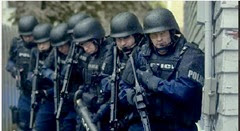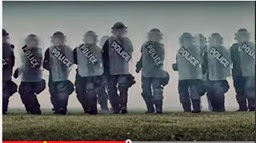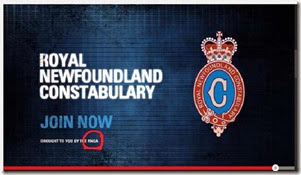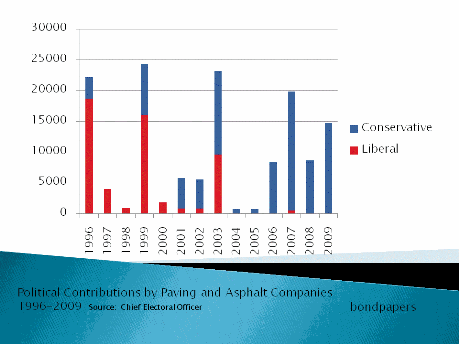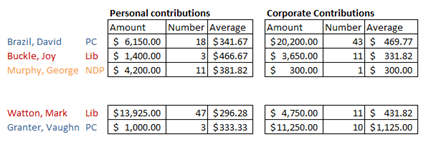In the wake of the Watergate scandal over 30 years ago, the United States Congress implemented the first of many reforms that set limits the amounts of money that can be donated for and spent on elections and that required disclosure of the names of who gave money to candidates in federal elections.
The most recent round of reforms, in 2002 aimed at restricting access to so-called "soft money". This is money that was spent on purposes which were political in nature but which fell outside the rules on election financing. Unlike "hard money" that fell within the rules, soft money is often never disclosed in any way. Donors are invisible to the public. How the money is spent is also hidden or at least partially obscured from public view.
In the relentless pressure of American elections, both candidates and incumbents have become crafty in finding and using soft money. The most recent tactic is for incumbents to establish private charities that are legal, above-board and aimed at a specific purpose within the incumbents own electoral district. Armed with charitable status, the politician's private organization can now receive donations and issue tax receipts. It can spend money, giving the politician full credit - and all the associated publicity - for good work. In some instances, campaign staffers can find employment in between elections with the politician's charitable organization. Perhaps the most well-known of these soft money charities is the Ted Stevens
Foundation, "an Alaska non-profit corporation created by Alaskans to recognize and honor the career and public service" of the senator from the most northern state.
Seen in that context, recent revelations that members of the House of Assembly use public money to make private gifts and donations around the province take on a decidedly different colour.
Newfoundland and Labrador has relatively few restrictions on election financing compared to other jurisdictions in Canada. However, the 1991 election
reforms did restrict how much may be spent on campaigns during election periods. The spending cap is not high by modern standards but it is based - among other things - on the understanding that in a small place where turn-out on polling day is relatively small, a handful of votes can swing an election in a given district one way or another.
While it may not have been the intention, local politicians have created a particularly pernicious form of soft money spending through their perversion of the House of Assembly constituency accounts. Like all soft money, the gifts and donations are essentially invisible. While they may be backed by receipts, the details of who received money, how much money they got and when they got is not available for public scrutiny. The system set by the members of the legislature themselves is the epitome of unaccountability and opaqueness, no matter how many times politicians insisted otherwise.
And with all due respect to the commissioner for members' interests, our political society is long past the naive, almost child-like view that all politicians are honourable and must be presumed to be so until proven otherwise. For one thing, there is ample evidence from many jurisdictions, including our own, that while the majority of politicians are upstanding and ethical, there are always a few who will skirt the edges of propriety and, in some instances, the law.
For another thing, if the entire system of spending is as comfortably hidden from public scrutiny as the constituency allowances have been, there simply is no opportunity for anyone to demonstrate impropriety. The argument may be convenient, but it doesn't pass the most cursory scrutiny.
In the soft money context, the Williams Family Foundation (WFF) also takes on an interesting cast as well. From every perspective it is legally established, hands out money only to identified and worthy charitable purposes and complies with all the legal requirements; but these are the legal requirements for a charity.
This is no ordinary charity, however. It is intimately tied to an active politician. As the Premier and his staff have demonstrated repeatedly since 2001, they are not above drawing very loud, public attention to the generosity of politician Danny Williams.
We would be naive in the extreme - we would be willfully blind - if we did not understand that news media coverage of a cheque being handed from the "Danny Williams Foundation" did not produce a considerable political effect for politician Williams. It is the same effect, albeit on a much smaller scale, that public money has brought for politician Gerry Reid or a host of other politicians spending public money on gifts and donations.
Danny Williams apparently sustains the WFF with his political salary. Canada Revenue Agency documents appear to confirm this, although there are some questions that arise from the public information that is available. For example, even though WFF obtained charitable status in February 2003, it lists the total contributions for the year as being only $20, 000. It also appears to be missing several donations made after that date and in advance of the election.
Some of the Premier's defenders - many of them no doubt organized by the Premier's Office - have held the view that what the Premier does with his salary is his own business. This would be true were it not for two over-riding factors.
First, the Premier could claim his salary is private if he were a private citizen. He is not. Williams is an active politician and as much as he may whine about the goldfish bowl of scrutiny in which he lives, that scrutiny he finds so burdensome is the heart of the transparency and accountability he claims to embody.
Second, the Premier could claim his salary is private had he not made such a huge public issue of the fact that his overwhelming personal wealth has enabled him to donate his personal salary to charity. Danny Williams himself made the salary a public issue. Williams can scarcely claim privacy now when people are asking where the money goes any more than Brian Tobin, amid accusations Tobin was trying to finagle a job for his wife, could whine about his wife being a private person when Tobin used her as a political prop at every opportunity. One cannot have ones cake and eat it too.
Ultimately though, none of this is to suggest that the WFF is anything more than a well-intentioned charity, funded by Williams himself. He has gained and will continue to gain an undeniable personal advantage from spending public money - his salary - as gifts and donations through the family foundation. But the political and ethical issues raised by the WFF can be addressed by some simple administrative arrangements.
The real problem with this local version of soft money is the precedent Williams and his colleagues in the House of Assembly have set. Even if Chief Justice Derek Greene proposes to ban gifts and donations of public money for incumbetn legislators, Danny Williams and the WFF have given future wiley and unscrupulous politicians a model to use for purposes that may prove to be far less virtuous than those of Danny Williams.
The lure of soft money is a powerful one indeed. If all people were saints, as Chuck Furey assumes of politicians, then we would need no laws at all. However, all men and women are not as pure as we might wish and as virtuous as a single politician and his family charity might be, we cannot ignore the potential that others of much lower ethical standards will not take advantage of the precedent.
After all, it's not like we haven't seen a set of rules for constituency allowances set tightly and appropriately at one point only to find the rules tossed out the window by a later crowd of politicians.
